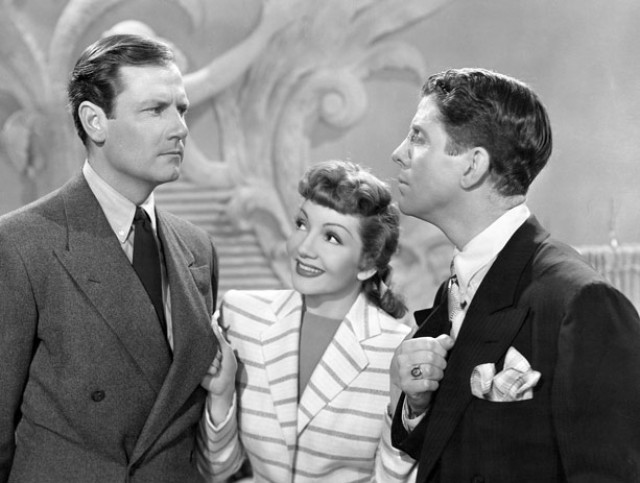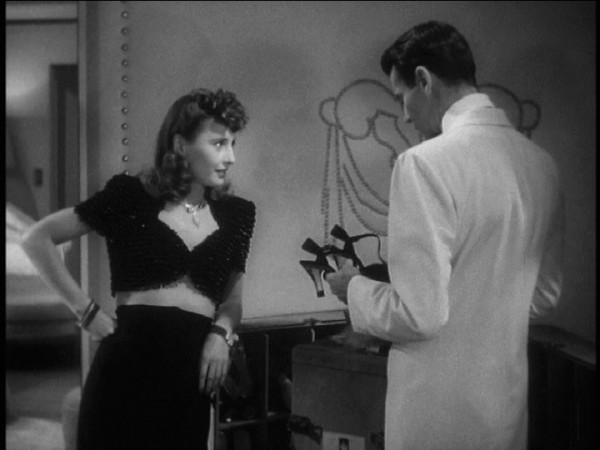THE LADY EVE (Preston Sturges, 1941) / THE PALM BEACH STORY (Preston Sturges, 1942)
Film Forum
209 West Houston St.
Friday, April 17, and Saturday, April 18
Series runs through April 26
212-727-8110
filmforum.org
While it’s often lumped in with classic screwball comedies, Preston Sturges’s The Lady Eve is much darker and slower than its supposed brethren. An alluring, tough-talking Barbara Stanwyck is first seen as Jean Harrington, a con artist looking to trick a wealthy man on a cruise ship. At her side is her father, “Colonel” Harrington (Charles Coburn), a gambler and a cheat. As soon as Jean sees rich ale scion Charles Pike (a wonderfully innocent Henry Fonda), she digs her claws into the shy, humble man, challenging the Hays Code as she shows off her gams and leans into him with a heart-pounding sexiness. Pike, of course, falls for her, but when his right-hand man, Muggsy (William Demarest), discovers that she regularly preys on suckers, Charles is devastated. However, in this case, Jean’s feelings might actually be real, forcing her to go to extreme circumstances to try to get him back. Stanwyck is, well, a ball of fire as Jean/Eve, determined to win at all costs. Fonda, not usually known for his comedic abilities, is a riot as poor Hopsie, as Jean calls him; the looks on his face when she ratchets up the sex appeal are priceless, and a later scene when he keeps falling down at a party displays a surprising flair for physical comedy. The film was based on an original story by Irish playwright Monckton Hoffe, who was nominated for an Oscar. The opening and closing credits feature a corny animated snake in the Garden of Eden; in The Lady Eve, Stanwyck offers the apple, and Fonda can’t wait to take a bite. And there’s nothing shameful about that.

Joel McCrea, Claudette Colbert, and Rudy Vallée are caught up in a romantic triangle in Preston Sturges’s THE PALM BEACH STORY
Writer-director Sturges was on quite a roll in the early 1940s, making a string of memorable pictures that included The Great McGinty, Christmas in July, Sullivan’s Travels, Hail the Conquering Hero, The Miracle of Morgan’s Creek, and The Lady Eve. In the midst of that amazing run is The Palm Beach Story, one of the craziest of the classic screwball comedies. Running out of money, married couple Tom (Joel McCrea) and Geraldine Jeffers (Claudette Colbert) are preparing to leave their ritzy Park Ave. apartment until a straight-talking, shriveled old wienie king (Robert Dudley) hands Gerry a wad of cash so she doesn’t have to move out. She pays off their many bills, but Tom is suspicious of how she got the money, demanding to know if any sex was involved, a rather risqué question for a 1942 Hays Code-era romantic comedy. Gerry decides that she is no good for Tom and insists on getting a divorce even though they still love each other. So she grabs a train to Florida, meeting the wacky Ale & Quail Club and John D. Hackensacker III (Rudy Vallée), a kind, soft-spoken gentleman who takes a liking to her and helps her out of a jam. Things reach a manic pace as Tom heads to Palm Beach as well, trying to save the marriage while fending off the advances of the Princess Centimillia (Mary Astor). McCrea and Colbert make a great comic duo, displaying a fiery sex appeal that is still hot all these years later. What’s not hot is the film’s use of black characters, who are horribly stereotyped and are even referred to as “colored” in the credits. It might have been a different time, but there aren’t a whole lot of quality movies that were that blatant about it. In addition, the shooting scene with the Ale & Quail Club goes way over the top. But when the film focuses on Tom and Gerry, caught up in their own endlessly charming game of cat and mouse, The Palm Beach Story shines. A double feature of The Lady Eve and The Palm Beach Story is playing Film Forum on April 17 & 18 as part of “Strictly Sturges,” a two-week series, continuing through April 26, that celebrates the career of the playwright, screenwriter, and director who was born Edmund Preston Biden in Chicago in 1895 and passed away in New York City in 1959. The festival consists of all of his directorial and screenwriting efforts; among the other upcoming double features are The Miracle of Morgan’s Creek and Hail the Conquering Hero, Mad Wednesday and Never Say Die, and The Great McGinty and The Great Moment, in addition to solo screenings of Christmas in July, Sullivan’s Travels, If I Were King, and others.
